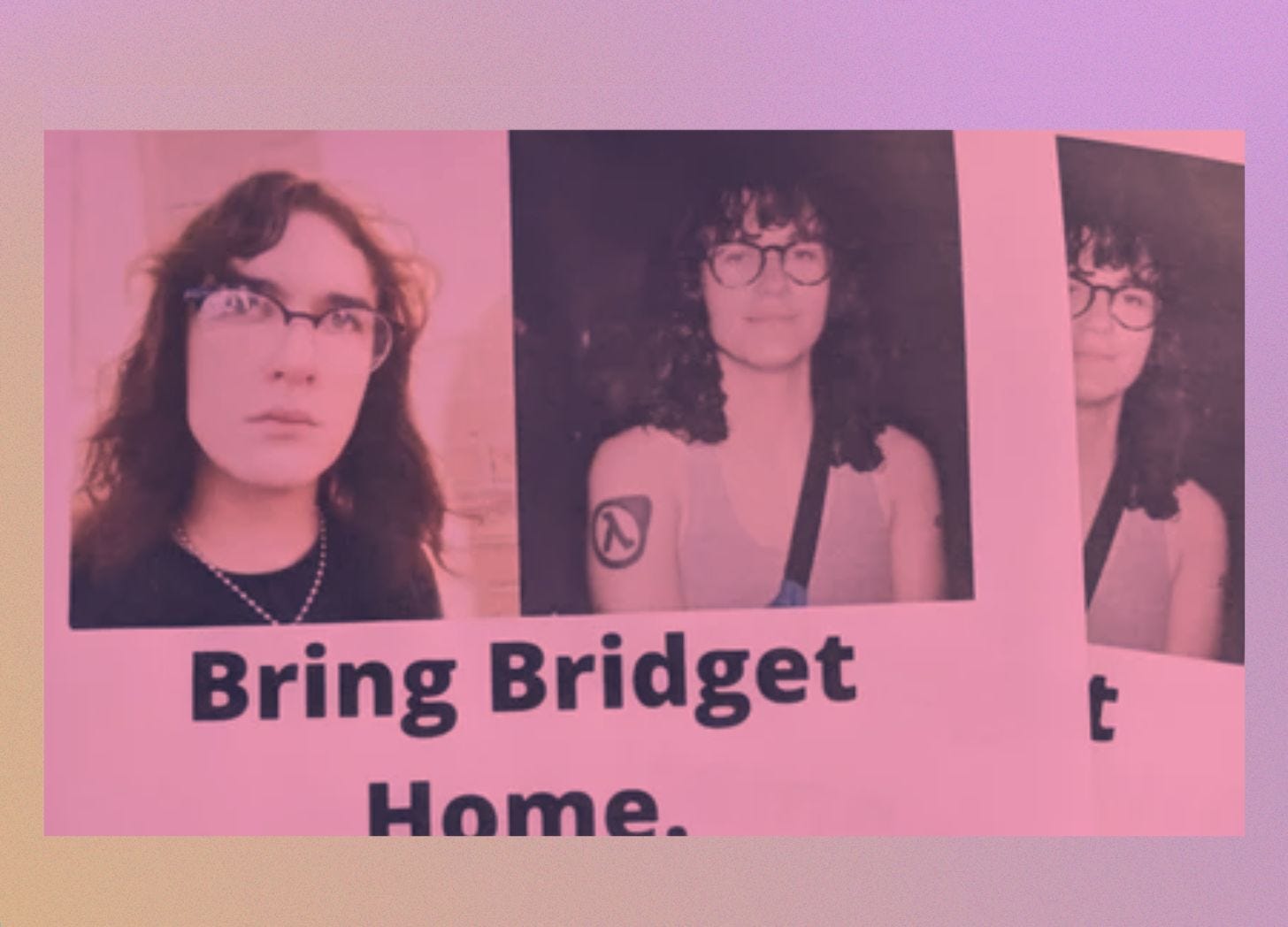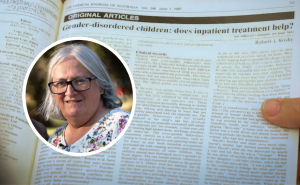This article was originally published by the Nonsense Newsletter team. You can find the original article here.
On 11 December 2020, 28-year-old DJ and union worker Bridget Flack was found dead in bushland near Kew. The discovery of her body came after a twelve-day coordinated search, led by the queer community and over a hundred local residents from the Fairfield area. Bridget had a history of poor mental health, like many trans women, and was attempting to organise support from a mental health facility at the time she disappeared. Evidence suggests she took her own life.
The story of Bridget’s death came up again recently due to the investigation by Coroner Ingrid Giles into the deaths of five transgender women, all of whom died during the COVID-19 pandemic, in which Bridget was the lead case. The other four cases were those of Natalie Wilson, Matt Byrne, Heather Pierard and a 19-year-old girl who was referred to by a pseudonym AS. The coroner found that while all five seemed to have established support networks, all had history of severe mental health issues and were fearful of accessing health services due to their trans femininity.
In the nearly four years since Bridget’s death, we’ve had neo-Nazis marching down the streets of Melbourne during an anti-trans rally, multiple instances of anti-trans propaganda being broadcast on mainstream television, and the election of Anthony Albanese as Prime Minister who then preceded to flip-flop on his commitment to include transgender people in the census. Trans women sure have to deal with a lot in this country.
Coroner Giles’ findings were a breath of fresh air in the midst of all this, as it came with staunch recommendations that included urgent investment in transgender healthcare and training for police and mental health workers in transgender issues. Nearly all of Australia’s mainstream networks reported on the findings, however, the methods in which this reporting was done, combined with the harsh realities which demonstrate why these findings will still fall drastically short, leave very little respite for our community.

How did the media screw up this time?
The findings themselves are available on the website of the Coroners Court of Victoria. They are extremely long and detailed, with even the shortest stretching to 98 pages, but worth a read nonetheless. It warmed my heart to read about who these women were as people, featuring Heather’s love of animals, Natalie’s volunteer work for her local op shop, Matt’s computer programming skills, AS’ tenacious relationship with her sister, and Bridget’s creativity in writing, drawing, music and organising. These are sides to our stories that are rarely featured in the media, which usually instead favour the cisgender perspective on our lives and our trauma.
Given this and how traumatic these deaths were for our community, it’s a shame such sensitivity didn’t carry across to every aspect of the media reporting. The ABC ran with the coroner’s call for “urgent investment into health care for trans community, following five tragic deaths”, which while standard reporting, also comes from the broadcaster which platformed inflammatory information from anti-trans hate groups about our healthcare on Four Corners last year. The Age ran with “the coroner urges missing persons overhaul after probe into deaths of young trans women”, focusing on VicPol’s self-admitted failure to properly handle the Bridget Flack case. Given that this is the same VicPol which has a recent history of violently protecting rallies centred on anti-trans hatred, it’s probably good to be sceptical about this.
The most unfortunate headline, however, came from The Guardian. After a history of reporting on the inquest as it was being compiled, the supposedly left-leaning newspaper ran with a headline, which I won’t repeat, which focuses in on the chemical used in three of the suicides and the coroner’s recommendation of its restriction. It’s responsible for a media organisation to cover all of the recommendations, but a headline that focuses specifically on the suicide method is not just re-traumatising, it is immensely disrespectful. The impact of this can be summed up by what happens when you google Heather Pierard’s name. Rather than any content about who she was as a person, her top result is now occupied by her cause of death.
Who these women actually were
The COVID-19 pandemic and, in particular, the 112 day Melbourne lockdown, was a deeply traumatising event in recent history for everyone impacted. For young trans women living in poverty who relied on their community for a sense of stability, purpose and security, we experienced that trauma more heavily than most. Bridget was well-known in the Melbourne rave scene as a DJ (DJ Brigida), the co-founder of biannual art rave Vapor Noir, and someone devoted to showcasing the power of trans femininity. The lockdowns, and the isolation and divisiveness during that time, was a brutal experience for her, and the lack of medical support available to marginalised people, tricky at the best of times, was too much for Bridget. Her sister, Angela Pucci Love described her sister as a “beautiful and loyal friend,” who was “smart, artistic and creative.”
Heather, likewise, was a community-orientated woman present in the queer scene and the furry scene who was shaken badly by the isolation of the lockdowns, and she struggled with seeking mental health support even before she started transitioning. She had many hobbies, including playing bass, social work and trainspotting. One of her friends spoke to me saying, “I remember having deep and passionate debates about which of the Melbourne Metro fleet was the best EMU (Electric Multiple Unit), I wish she was around to see the new HCMT sets come online.”
The most horrifying indictment on the inaccessibility of our healthcare came in the inquest of Matt Byrne, who after the frustrations of the immense costs, long wait times, and psychiatrist gatekeeping required to obtain genital reconstruction surgery (GRS), went through with a “backyard surgery” by an unlicensed practitioner who had no medical training. This kind of exploitation of desperate trans women living in poverty is sadly not uncommon, and it is never a good idea. Matt had attempted to seek mental health support in the past, but kept getting bounced back by doctors who had moved clinic, were too expensive, or gave her faulty referrals. She also refused to go to hospital because, to quote the report, “it would just be shit and she wouldn’t get any real help”.
Coroner Giles stated that the enormous costs, wait lists and complications in accessing healthcare, for both physical and mental health, was “untenable for patients and healthcare providers alike”, particularly since trans women experience suicidality much higher than the general population. Switchboard Victoria, a community organisation which specialises in suicide prevention, responded by stating that they would hold the government to account to make sure that the recommendations were implemented.
These are nice intentions, but I have no optimism that the government has any interest in following through with them. Even if they did, it would be a rainbow-coloured bandaid over a gaping, infected wound.
Why these recommendations aren’t enough
Even if Albo leapt up to the podium tomorrow, offered a whole-hearted apology for all the ways he’s failed the queer community, and immediately implemented all the recommendations, there would still be significant gaps in our community’s needs and welfare. Putting all of our healthcare onto Medicare would still mean that a massive portion of our community would be unable to access their healthcare needs, whether that be because they can’t access Medicare due to not meeting residency criteria or other bureaucratic reasons, or simply due to still being unable to afford gap fees that are a common part of public healthcare.
As the housing crisis deepens, the poorest of us are being pushed out to fringes of cities by ridiculous rent prices, meaning that a trip to the very few psychs that offer transgender-specific care is more costly in time and transport as well. More time that the poorest people don’t tend to have, and more time out in the open which puts us at greater risk of transphobic hate crimes. Fucking stressful!
These aren’t issues that a suicide helpline or better police training can fix. A phone call can’t put food on your table or cover your psychiatrist gap payments. Having a sense of dread and hopeless about the realities of discrimination and societal neglect isn’t something that the best intentioned switchboard operator can solve. They are only problems that can be solved with giving every single person financial security and the ability to pursue their sense of self without government judgement and intervention.
The five women who took their own lives never had to witness the horrifying rise of neo-Nazism that has taken place on the streets of Melbourne in the years since the pandemic. It is a widely known fact that anti-trans hatred such as that which was permitted across the country, and protected by police, massively contributes to the distress and anxiety which is such a common factor among the transgender community.
This inquest caused the subject of transgender suicide to enter the headlines, but zero responsibility has been taken for the hostile climate that leads to these tragedies by those who were complicit in it. The newspapers reporting on the inquest showed no self-awareness about their history of platforming the anti-trans hatred that contributes directly to our social isolation, and it is impossible to believe that Victoria Police will act in the best interests of our community when they are unapologetically protecting public rallies centered on transphobic hate.
It is abhorrent that Heather Pierard’s name is going to be centered on a headline that is based around clickbait and cisgender voyeurism rather than who she was as a person. It isn’t just because the proposed ban on the chemical which took her life will do fuck-all to improve living standards for our community, it minimises the immense level of pain, isolation and hopelessness that led to her suicidality. Attributing her death solely to the chemical rather than the failings of society is misleading at best and horrendously transphobic at worst. Suggesting that a ban on it may do anything to change the suicide rates of our community is like suggesting that a social media ban would reduce youth crime. It won’t. It’s pathetic.
It’s always a struggle to talk about suicide, and reading this article may be triggering or uncomfortable. But the problem is, the feelings of anxiety, frustration and grief that might arise when reading about this are constantly present in nearly every trans woman. We can’t escape the reality that suicidal ideation is second nature to so many of us in the community, and that if we don’t care for each other, the numbers of us who die by suicide would be much higher. It’s honestly a testament to the strength and power of our community that as transphobic hatred and rhetoric has grown more mainstream, more of us haven’t been killed. It’s not as though we just wait and pray that things might change. When we don’t have access to hormones, money and therapy, we provide that for ourselves. We don’t have a choice.
You can see this play out as well. When police told Bridget’s sister Angela that “nothing else could be done” to find Bridget, the queer community created a Facebook page to continue to search. When the police was protecting a transphobic hate rally that was attended by a member of state parliament, it was the transgender community that protested it and organised a counter-rally that filled the streets of Melbourne with pink, blue and white. This is why the pandemic was so hard for us. It wasn’t just the constant fear of the virus or the bottlenecks in our healthcare, it was the inability that reach community support that is so often the only lifeline we have.
This is why I love the trans femme community, and why I love fighting for our rights. We put up with endless streams of cisgender nonsense from those of us who shamelessly hate us, and those who mean well but are horribly naive about our needs. We are burdened by endless costs of our healthcare, constant derision and hyper-sexualisation by all corners of society, and the greatest prospect cisgender people imagine for us is how well we can emulate a cis person, as though we innately should feel shame for who we are. It’s hard to feel shame for you are when you know that most cis people would never be able to cope with half of what we deal with everyday.
We deserve more than “commitments” and “training” from the government and police. I can’t put into words here the level of rage I feel at the amount of loss that has taken place among nmy friends on their watch. All I can expect is that as we continue to fight, and as we continue to be able to write our stories and publish them, we can slowly gain the respect and appreciation that we deserve.
It’s nice that we have a full inquest that details the stories of these women, even if some of the headlines were insulting, and it’s also nice that Bridget’s writing is available to read. It’s nice that these women are more than just numbers in a spreadsheet as we usually are when we die by suicide. They were valued members of a community that is still amongst the most vibrant and protective in Australia. The community will always grow stronger.
—
Natalie Feliks is a writer and activist originally from Adelaide, now living in Melbourne. She’s written for the likes of Junkee, Crikey, and Overland, and spends her time listening to pop music and eating chocolate.
The LGBTQIA+ Media Watch Project is partially funded by The Walkley Foundation, and proudly pays queer writers, journalists and experts to write about LGBTQIA+ representation in media and culture. To support writer-owned, independent, queer-led media, please consider subscribing – this is how we pay our writers!




